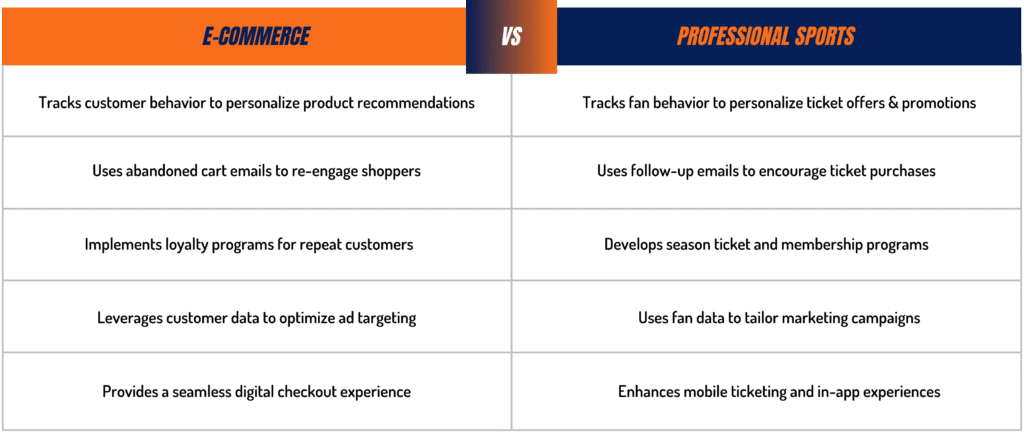In today’s digital world, professional sports teams and e-commerce brands share a common goal: engaging their audience, personalizing experiences, and maximizing revenue. E-commerce companies have mastered the art of using data to build seamless customer journeys, and sports organizations can apply these same principles to improve fan engagement, boost ticket sales, and increase loyalty.
The Parallels Between E-Commerce and Professional Sports
Both e-commerce businesses and sports teams are focused on attracting, retaining, and monetizing their audiences. Here’s how they compare:

By applying e-commerce best practices, professional teams can enhance their fan engagement strategy and turn casual supporters into loyal, lifelong fans.
1. Personalization: The Key to Fan Engagement
How E-Commerce Does It:
Online retailers like Amazon, Nike, and Fanatics analyze purchase history, browsing behavior, and demographic data to deliver personalized product recommendations. These brands ensure that every customer sees content that is relevant to their interests.
How Professional Teams Can Apply This:
🔹 Dynamic Ticket Pricing & Offers – If a fan buys tickets to every Friday home game, the team can offer a personalized discount on future Friday games.
🔹 Customized Merchandising – Show fans apparel recommendations based on their favorite players or past purchases.
🔹 Targeted Email & SMS Campaigns – Instead of generic promotional emails, teams can send personalized messages highlighting relevant games, events, and exclusive offers.
Example: A fan who attends multiple games but hasn’t purchased season tickets could receive an offer for a partial season plan that matches their attendance habits.
2. Abandoned Cart Recovery: Driving Ticket Sales
How E-Commerce Does It:
If a shopper adds items to their cart but doesn’t complete checkout, e-commerce platforms send automated abandoned cart emails with reminders and incentives to complete the purchase.
How Professional Teams Can Apply This:
🔹 Abandoned Ticket Checkout Reminders – If a fan selects seats but doesn’t complete the purchase, send a reminder email with a limited-time discount.
🔹 Retargeting Ads – Show fans targeted ads featuring the specific game or seats they viewed but didn’t buy.
🔹 In-App & SMS Nudges – Push notifications reminding fans to secure their seats before prices increase.
Example: A fan views tickets for an upcoming rivalry game but doesn’t complete the purchase. A follow-up email with “Your Seats Are Still Waiting” and a time-limited promo code could encourage them to finalize the buy.
3. Loyalty Programs & VIP Experiences
How E-Commerce Does It:
Retail brands use rewards programs (like Starbucks Stars or Nike Membership) to encourage repeat purchases and brand loyalty. Customers earn points for purchases, referrals, and interactions, which they can redeem for discounts or exclusive products.
How Professional Teams Can Apply This:
🔹 Season Ticket Member Perks – Offer exclusive rewards such as meet-and-greets, early access to new merch, or free concessions.
🔹 Gamified Engagement – Reward fans for attending multiple games, engaging on social media, or using the team’s mobile app.
🔹 Exclusive Access – Provide VIP experiences (like batting practice access or locker room tours) to loyal fans who consistently attend games.
Example: A fan who attends five home games in a season could earn a “Fan MVP” badge that unlocks free team swag or priority access to playoff tickets.
4. Frictionless Digital Experience
How E-Commerce Does It:
Top online retailers provide fast, seamless checkout experiences with mobile payment options, one-click purchasing, and easy navigation.
How Professional Teams Can Apply This:
🔹 Mobile Ticketing & Fast Checkout – Ensure ticket purchases are as easy as ordering from Amazon by integrating Apple Pay, Google Pay, and PayPal.
🔹 In-App Ordering for Food & Merch – Allow fans to order food, drinks, and merchandise from their seats and pick it up without waiting in line.
🔹 Simplified Account Management – Let fans easily transfer tickets, manage season passes, and update payment info from one place.
Example: A fan should be able to buy game tickets, order a jersey, and reserve a parking pass—all within a single mobile app.
5. Data-Driven Marketing & Fan Insights
How E-Commerce Does It:
E-commerce brands analyze customer behavior to improve ad targeting, product recommendations, and promotional timing.
How Professional Teams Can Apply This:
🔹 Fan Segmentation – Categorize fans based on behavior (season ticket holders, casual attendees, first-time buyers) to send more relevant promotions.
🔹 AI-Powered Engagement – Use machine learning to predict fan preferences and recommend experiences that match their interests.
🔹 Live Fan Sentiment Analysis – Gather real-time feedback from fans during games and adjust stadium experiences accordingly.
Example: If a fan consistently buys tickets for weekend games but never on weekdays, the team’s CRM could automatically offer them a “Weekend Game Pack” deal instead of generic promotions.
Bringing E-Commerce Strategies to the Fan Experience
Professional sports teams have a golden opportunity to improve fan engagement by learning from e-commerce leaders. Personalized marketing, frictionless digital experiences, and data-driven insights can turn occasional attendees into lifelong fans.
By integrating CRM-powered fan segmentation, targeted promotions, and loyalty programs, teams can create a more engaging, profitable, and fan-friendly experience—just like the best online retailers.
Is Your Team Ready to Elevate Fan Engagement?
Inner Join helps professional sports teams implement e-commerce-inspired engagement strategies through Microsoft Dynamics, Infotap surveys, and Power BI analytics. Let’s talk about how we can help your team connect with fans like never before!
